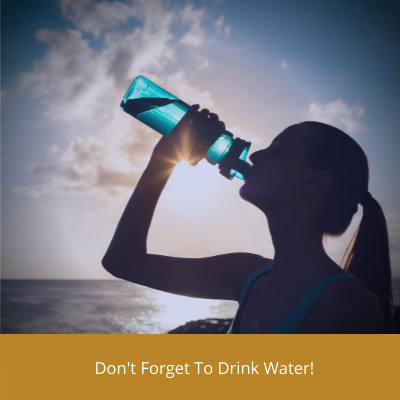Blog
- Home
- News/Events
- News
- Staying Hydrated This Summer
Keeping you healthy is our life's work.
Staying Hydrated This Summer
August 25, 2021
Did you know that you’re mostly made of water? If you’re an adult female, you’re about 55% water. Men are about 60% because they typically have more lean tissue (which contains more water) and women typically have more fatty tissue (which contains less water). Younger people have a higher percentage of water (babies are born at about 78%) and older folks have a lower percentage (about 50%). We all need a certain amount of water daily to survive. So, how much water do you need to drink every day?
Experts estimate that up to 75% of Americans aren’t drinking enough water to keep their bodies functioning properly. It doesn’t take much to throw off the balance and become dehydrated. If you wait until you’re thirsty to drink, you’re already dehydrated. Don’t let something as simple as drinking enough water send you to the ER — it’s really not a story you’ll look forward to telling around the water cooler.

When does dehydration occur?
At just 1% dehydration, or when you’ve lost 1% of your body’s water, mental performance and physical coordination start to become impaired — and you’re not even thirsty yet.
At 2 to 3% dehydration, you’ll feel thirsty and possibly some of these other symptoms:
- Fatigue, lethargy, fuzzy thinking
- Irritability
- Dizziness
- Headache
- Dry mouth and skin
- Muscle cramps
- Rapid pulse (100 beats/minute or higher)
- Fever and chills
Dehydration can be very dangerous, especially for infants, children and older people. Studies show that adults over 65 are at higher risk for dehydration because their thirst mechanisms can start to malfunction with aging. If someone you know shows signs of dehydration, seek immediate emergency medical treatment
Did you know water can also help prevent heart attacks? A study at Loma Linda University found that dehydration thickens the blood, making it harder for the heart to pump and increasing the risk of blood clots. Study participants who drank just 40 ounces of water a day cut their risk for heart attacks by 54% for men and 41% for women.
How much water is enough?
The commonly repeated advice to drink eight 8-ounce glasses of water a day (64 ounces) is a good starting point but may not be enough for many people. The National Academies of Sciences, Engineering and Medicinefound that adult men and women who were adequately hydrated consumed about 3.7 quarts (118 ounces) and 2.7 quarts (86 ounces) of water respectively.
Ultimately, how much water you need depends on a variety of factors, including:
- Your weight (a larger person needs more water)
- Your activity levels
- Your metabolism
- Your geographic location (people who live in hot, dry climates need more water)
- The weather
- Your diet (how much water are you getting from the foods you eat?)
- Your health (fever, vomiting, diarrhea and some medications and health conditions, such as diabetes, can increase your water needs)
You can reach us at:
- Toll-free 1-888-767-2222
- TTY: 1-800-735-2922
- Mon.–Fri. 8:30 a.m.–5 p.m. local time